Disclosure: Meeple Mountain received a free copy of this product in exchange for an honest, unbiased review. This review is not intended to be an endorsement.
I’ve already reviewed The Taverns of Tiefenthal, the excellent beer-themed Euro game designed by Wolfgang Warsch (The Mind, The Quacks of Quedlinburg, Wavelength).
When my friend and colleague Andy Matthews offered me the opportunity to review the first expansion for the game, Open Doors, I jumped. A chance to make one of my favorite games better? Yes, please.
Even though the base game has a few mini expansions built in (known as Modules), The Taverns of Tiefenthal could always use a little more content, right? Open Doors comes with 4 additional Modules which can be added to any of the base game Modules.
I gave all 4 new Modules a spin.
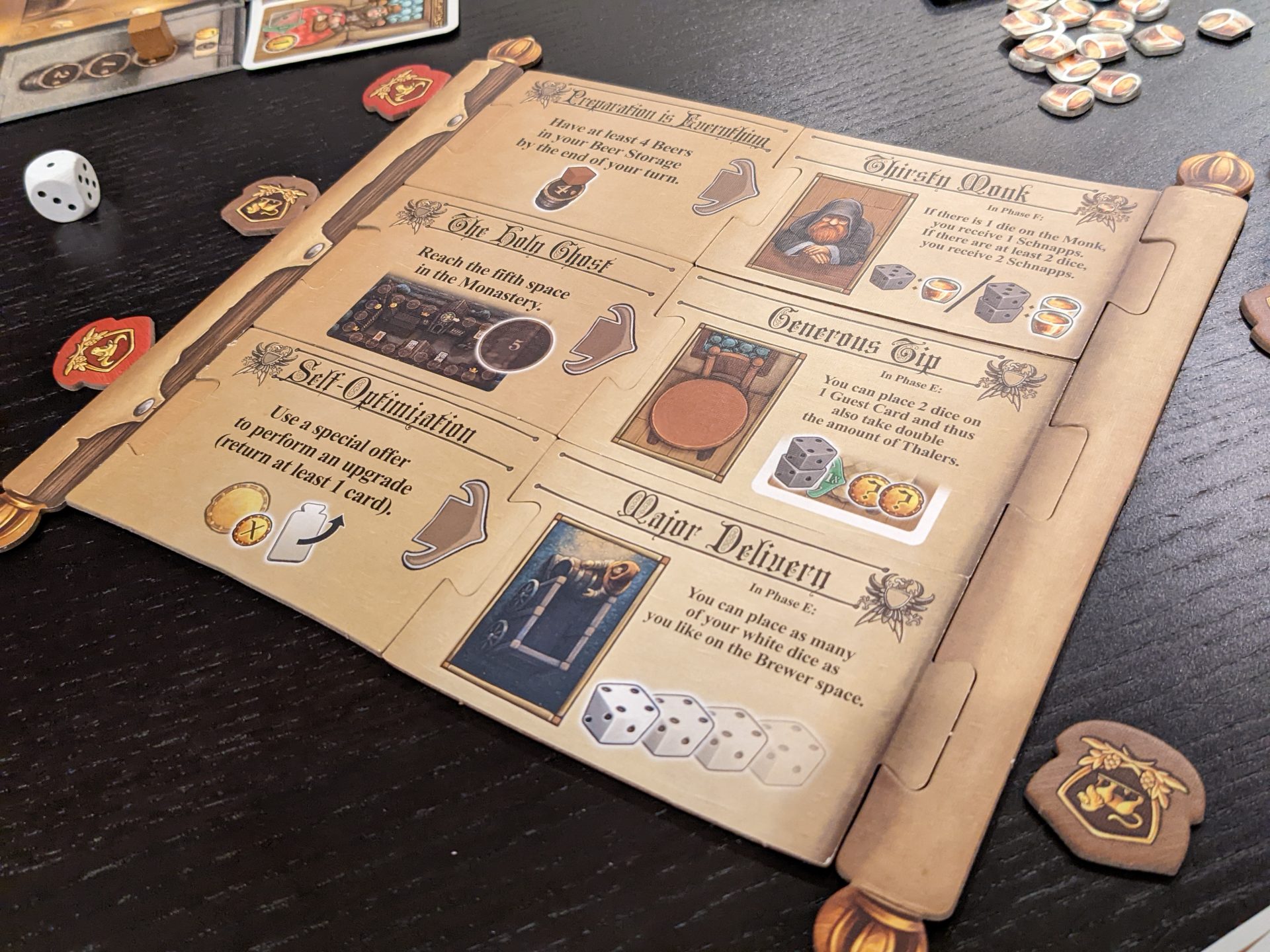
Module A: Switching to Wine
The first new Module adds the Wine Cellar and Sommelier staff cards.
When a Sommelier is played into your Tavern, they serve wine to the right-most Guest at your tables. A Wine Token (red cube) is placed on that right-most Guest, meaning they will be served wine and will not need a white die in order to generate cash for your tavern.
(This also means that you don’t get to cherry pick which of your Guests gets wine. I love this design choice; this means one of your terrible Guests, known as Regulars, might be the person to get a Wine Token, which is only a single coin, or Thaler. This also means that you can at least ensure you’re getting something out of these people that take up space!)
There is also a new Guest which can be served beer to be added to your deck: the Witch Doctor. The Witch Doctor triggers automatically when he enters your Tavern in a round. He grants either a single Thaler or the ability to re-trigger the immediate action bonus of any Guest currently in your tavern; if you use the latter ability, the Witch Doctor leaves your deck and is returned to the supply.
The Witch Doctor might be the best thing about this Module if played at the right time; if you’ve got Guests with juicy bonuses, burning the Witch Doctor to trigger an immediate action could swing sweet bonuses depending on the timing. Even better: the Witch Doctor only costs 2 Beers. This provides more early-game options to add quality cards to your deck.
“Switching to Wine” is an easy Module to add in and always pays dividends to players. Upgrading the Wine Cellar grants a permanent Sommelier, providing more dice placement options every round. Witch Doctors are a net positive. This Module should be added every time.
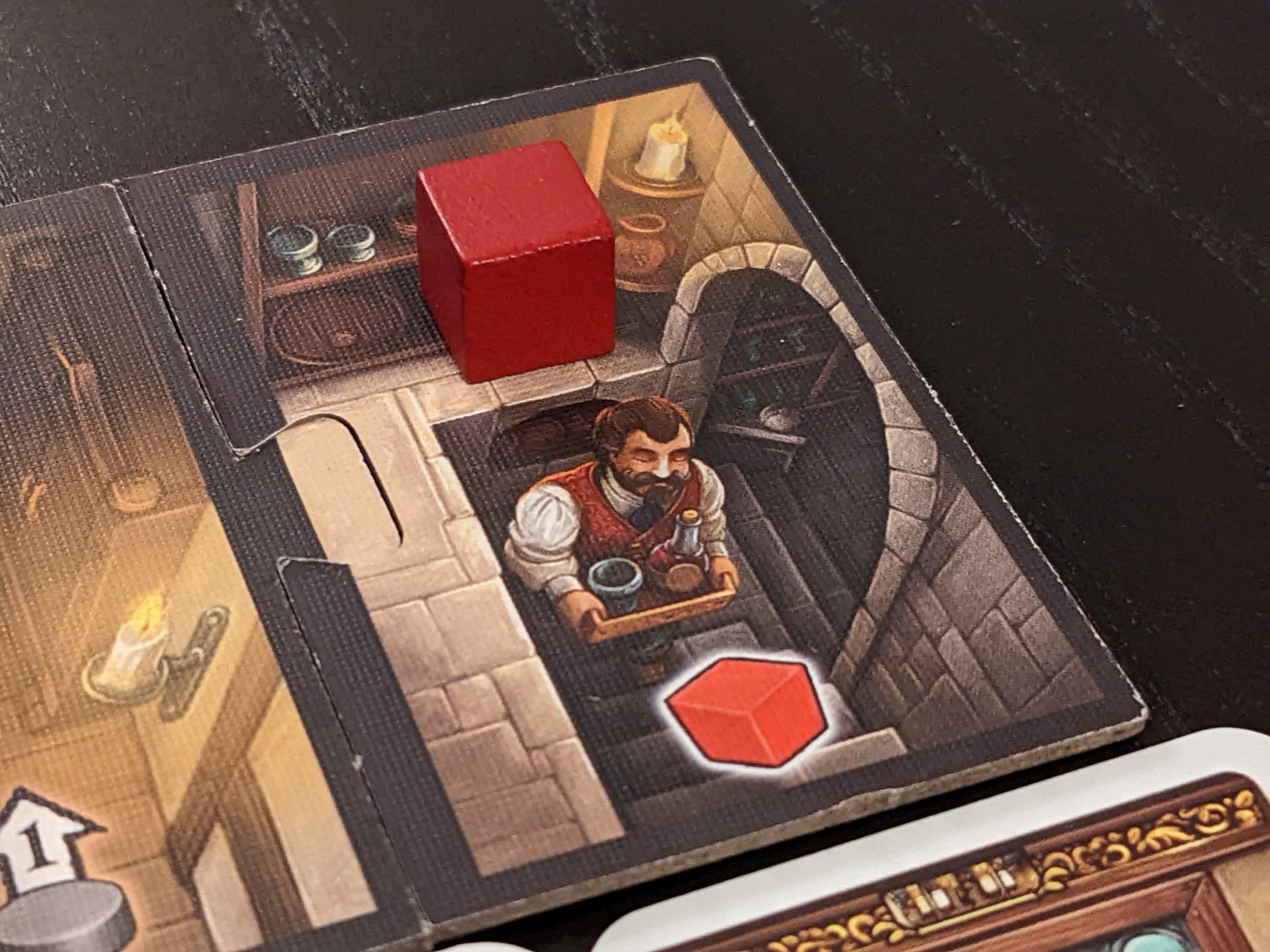
Module B: One Room, Please!
Now your Tavern is an Inn! Serving booze to Regulars doesn’t pay well enough, so in this Module, players have the chance to give their best Guests—Nobles—a place to sleep while also providing benefits to each player.
Well, not necessarily.
A set of 4 Guest Rooms now sit above your Tavern board. The rooms are well illustrated but all that matters are the 4 die faces, one at the bottom of each room. Each round, when (if!) you draw a Noble card, that first card can be slotted into one of the 4 rooms, which gives you a chance to trigger the bonus of that room if you draft a matching die.
A couple of the bonuses are excellent: you can trash—permanently discard—a Regular (one of your starting cards) and turn it into a Guest costing exactly 3 Beers. Or you could trash a better Guest and turn it into a new Guest from the market that is worth 1-2 Beers more. Therefore, you could turn a guest that costs 4 Beers into a different one that costs 6 Beers.
Or you could trigger the bonus that lets you draw an extra card. Another bonus lets you bump both your Beer Storage and Safe up one spot to provide more purchasing options later in the round.
There’s also a new card in this Module that begins the game in your discard pile: the Priest. Priests are unique amongst your Guests: they don’t provide any Thalers when a die is placed on their card. Instead, you get a single bump on the Monastery track, just like the Monk on your player board if you place a 5-pip die.
Yeah…no.
We’ll talk more about this in a moment, but this is the only Module that I would say is a miss. Not a complete fail, just a miss.
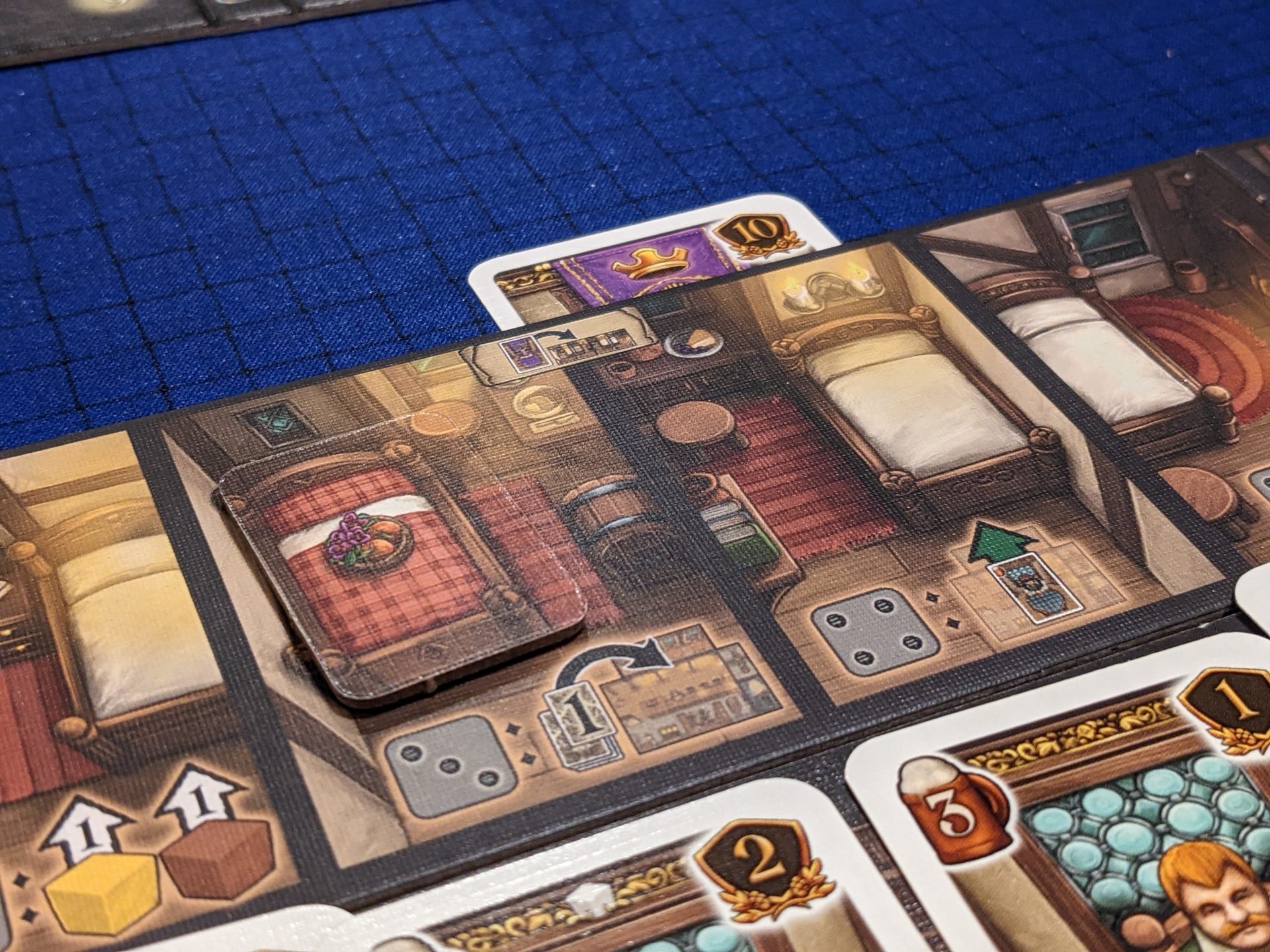
Module C: The Life of a Bartender
Player powers, you ask? Mr. Warsch has us covered.
During setup, players will draft one of 8 available player powers. All of them break the game. Some seem categorically better than others at a glance, such as the Player. The Player gets to place dice showing a 3 or a 4 on any action space. You know those early-game problems where you have no Regulars to place because you are picking from a bunch of 4s? Now, you are golden.
My wife had the chance to use the Master Brewer in her second play of Open Doors. The Master Brewer can recruit new Guests with a 2-Beer discount all game long. It felt like every round, she was adding juicy Guests to her deck. The Tax Collector player power gets a deck of 13 IOU tiles; once per round, the Tax Collector gets a small bonus from one of these tiles: maybe a Thaler, maybe an extra die, maybe the power to change two of their dice to whatever faces they would like.
In addition, a new Guest card is introduced: the Critic. Critics begin life in your discard pile, but when played to a table in your Tavern, they can be activated to give players a 2-space bump on the Reputation track.
Another easy Module to integrate into gameplay, The Life of a Bartender is a must. It’s fun to watch other players exploit their bonuses to maximum effect.

Module D: The Mayor’s Visit
It wouldn’t be a Euro without public goals, so now The Taverns of Tiefenthal has some too.
3 public goals, known as tasks, are added to a cute scroll in the center of your play area. Attached to each task is a reward; each time a task is completed, that player will have access to a one-time perk that can be used at any point later in the game. When all 3 tasks are completed, players can add the Mayor card to the top of their deck.
The Mayor card, in terms of bonuses and powers, is the best Guest card in the game that isn’t a Noble: once gained, players can upgrade a single part of their Tavern for free (no Noble bonus card, though). When played into a Tavern, the Mayor could earn as many coins as the pips on a die face. Place a 6, get 6 Thalers.
At the end of the game, each completed task also earns 5 victory points. That means 15 points are available to everyone, and achieving tasks becomes an important differentiator.
Like all of the other Modules in Open Doors, The Mayor’s Visit is easy to add and the 12 included goal tiles provide lots of variety because they are double sided: one side has tasks, the other has rewards, totaling 24 options that can be mixed and matched.
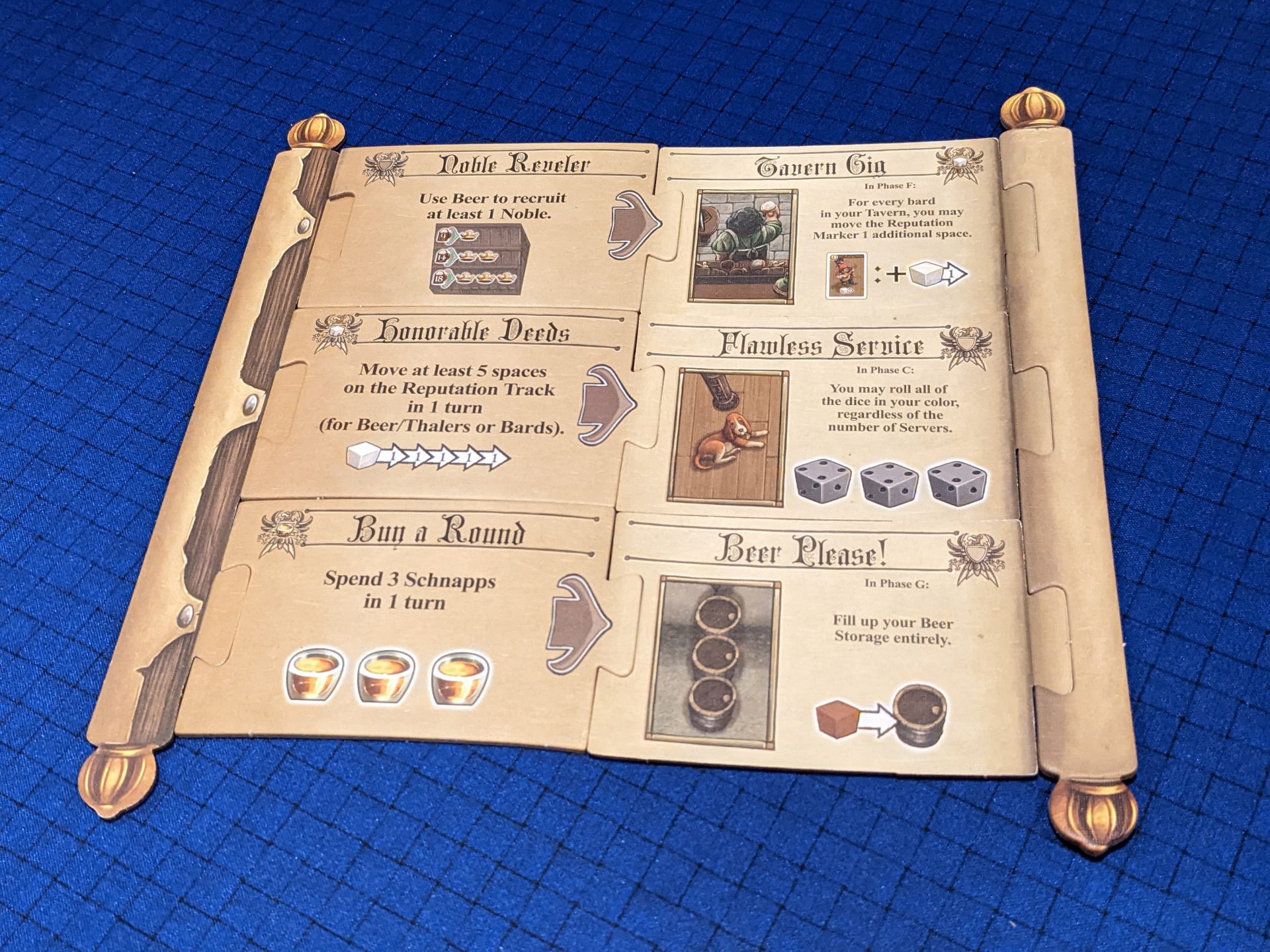
My Issue With This Much Game!!
I love the flexibility of the base game experience offered in The Taverns of Tiefenthal. While I typically only use the base game, schnapps and reputation (Modules 1, 2 and 3), more friends prefer to use Modules 1, 2, 3, and 5 (which adds the Guestbook and signature tiles).
For one of my 3 review plays of Open Doors, I went all-in: the base game’s 5 Modules, and the 4 Modules in this expansion. Getting all of that set up, sorted, and shuffled was a beast on my Game Topper.
I don’t think that the base game with Open Doors is too much game…but it’s pretty close. Purists will argue that they need it all, because everything makes sense. For anyone who knows all of the base Modules well, these 4 additions don’t crush the brain in a way that makes the effort unwieldy. (A game like Clinic: Deluxe Edition, on the other hand, with all of the 50+ expansions, is another story!!!)
Just know that setting all of this up, and then sorting and tearing all of this down, is an incredible chore. There are just a lot of little bits to separate. I removed the insert from my base game box so that I could get all of the base game and Open Doors expansion content into one box, but I still separate everything with baggies.
After your game is over, you’ll sort each of the 4 player color base board sets. Then, you are separately bagging the 4 extra Modules from the base game (2-5), and the 4 Open Doors modules, most of which have their own separate cards. Don’t forget all of the cards that are distinct from the base game, and you’ve got people asking a lot of questions as they pack things up to toss into the box.
You probably have a few games on your shelf that you love playing, but you hate unpacking to set up. Open Doors comes very close to that.
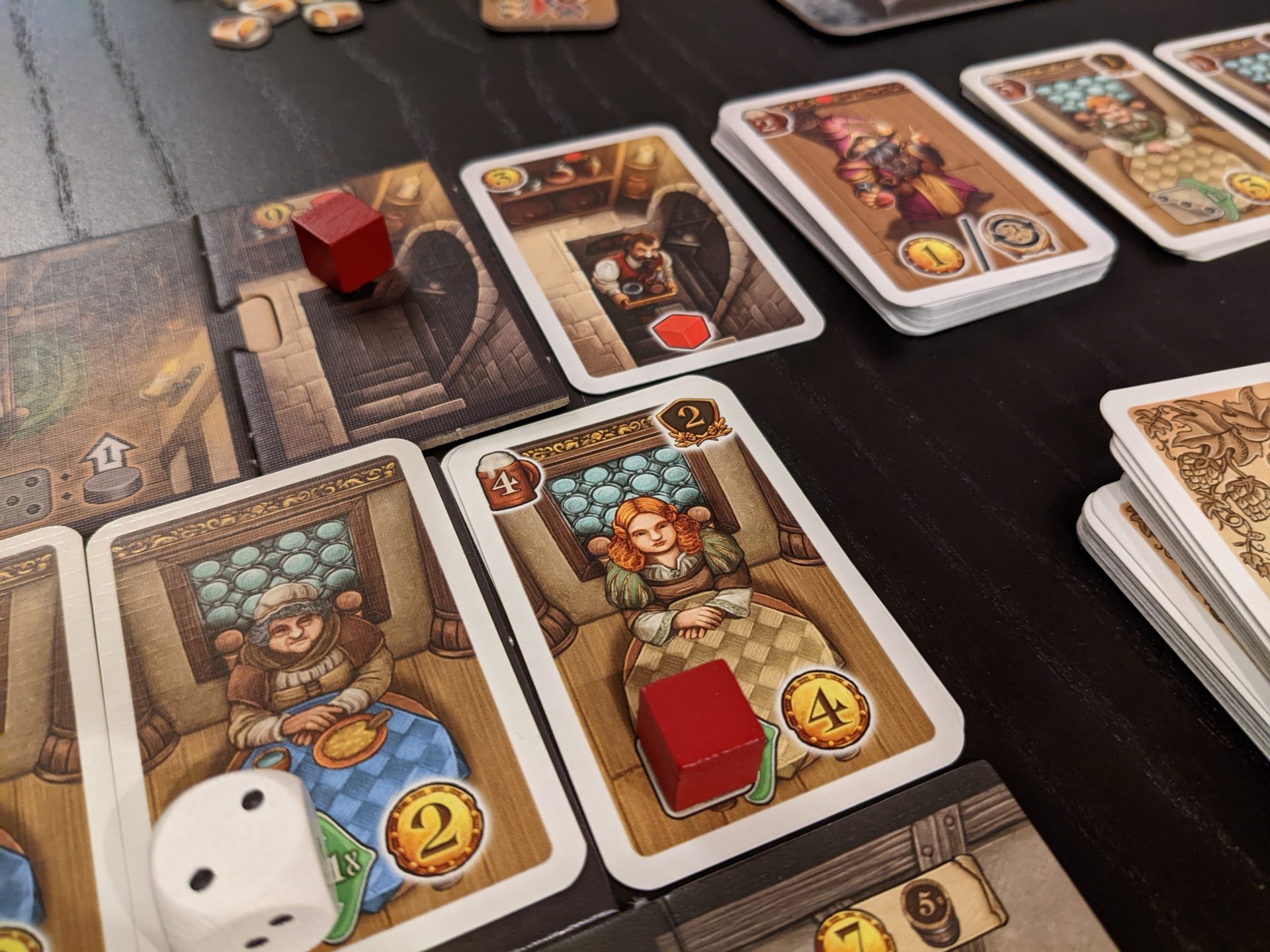
I Love the Base Game. Do I Need This?
Yes. Yes, you do.
Module C’s player powers alone make this worth it. These are what I like about games with player powers; while not as completely game-breaking as the ones from Marco Polo II: In the Service of the Khan, the powers in Open Doors are mostly great, and a couple seem very well aligned to pursuing certain strategies all game long. They also help kick slow starts into high gear right away.
The extras in Module A—Wine Cellars, Wine Tokens, and Sommeliers—ensure that you don’t get hosed as hard for at least a couple turns each game, maybe more if you commit to flipping that portion of your tavern early. Module D is also a no-brainer: Open Doors uses milestones as a way to provide direction to players, while also providing a Guest card so amazing it’s always worth pursuing.
Module B is the only one that I would say I only like, not love. The Priest card is crap, plain and simple, and continues the narrative that the Monastery board is a near-total fail. The bonus actions for the individual rooms are good, particularly the action to use a 4-pip die to upgrade a Regular or to upgrade a Guest with a 2-beer discount.
But that +1 Monastery move? No one I have played with has ever even lapped the Monastery board once, so the only way you might use this is if you are one space away from a free Noble.
Even then, many of the immediate effects on Guest cards grant players a free bump on the Monastery track. Guest cards are almost always better than the Monastery track, and sadly, nothing in this Module (and nothing that I’ve used in Open Doors so far) really incentivizes using that track more in the game.
A seasoned player of The Taverns of Tiefenthal will want this extra content. It is almost all great and keeps gameplay fresh. Using all of the base and expansion Modules is a chore (thanks to the involved setup steps required), but I could see heavy strategy gamers preferring this format every time they play.
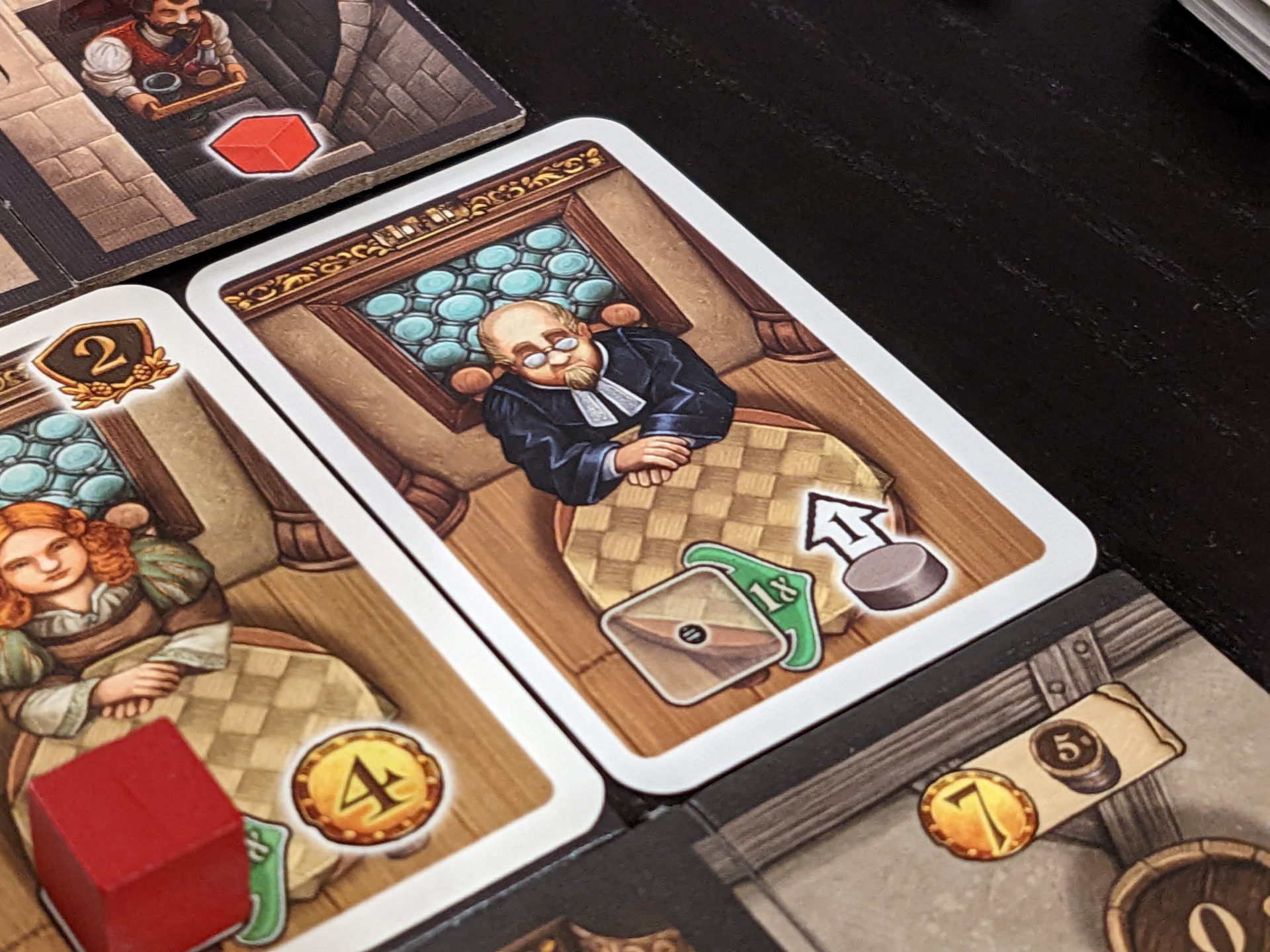
Now that I’ve played with everything a few times, here’s my perfect game:
- Base game: Modules 1, 2, 3, 5 (no Start Cards)
- Open Doors: Modules A, C, and D (so, no Guest Rooms and Priest cards)
I typically only used the Start Cards when playing with new players, to give them a varied way to see the game. When doing this, I would only use the base game (Module 1) and the Start Cards. I won’t use them with Open Doors because they make the draft of the player powers in Module C difficult: using the variant in the rules, it is recommended to snake draft one player power and one Start Card, which means the snake player (in a 4-player game, the person who picks 4th and 5th) has a slight advantage if they know how to best align the starting setup of their Start Card with their chosen player power.
Sticking with only the player power, and the normal setup instructions, works better.
Dropping Module B from Open Doors is easy. You won’t even use these additions for the first round or two, because without Nobles, none of the Guest Rooms trigger. The Priest card starts in your discard pile; as worthless as this card is, he doesn’t even show up in your deck until the second or third round.
And that’s before you place a Noble in one of your Rooms, then find yourself unable to draft a die that matches the pips needed to activate that bonus action, and that will happen from time to time. Module B is fine, but on its own doesn’t justify purchasing the expansion.
Thankfully, the rest of this content is excellent. If you are a fan of The Taverns of Tiefenthal, open your doors to Open Doors!


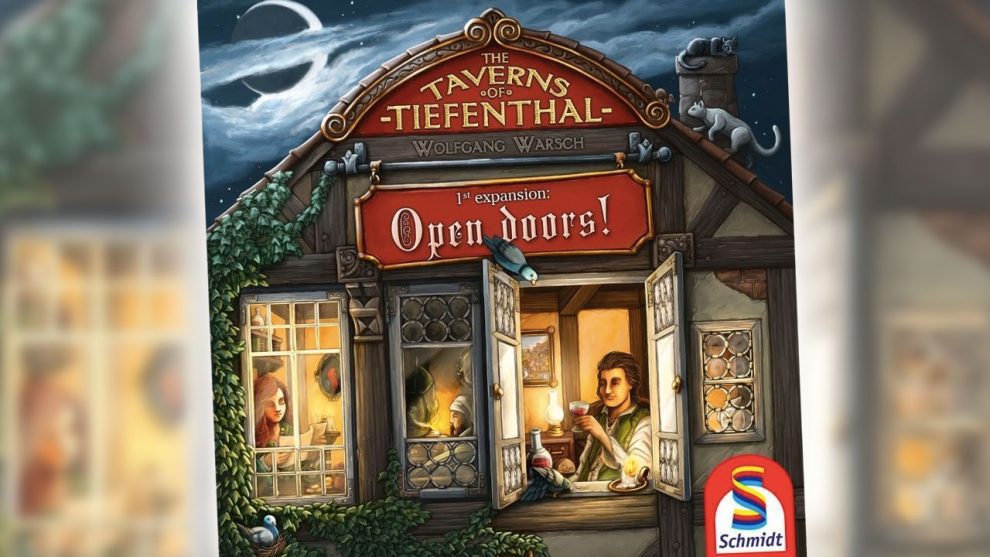









Add Comment